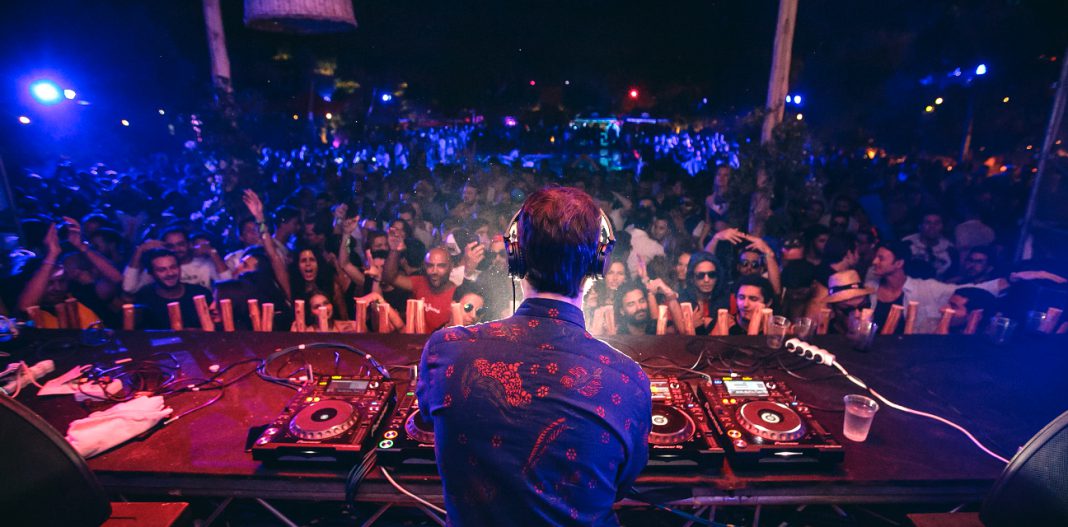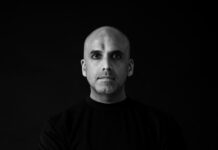Foto: Yassir Laghdas (Dixon)
A couple of weeks ago, Oasis Festival took place for the second time on the outskirts of Marrakech in Morocco. Followed by other new festivals such as Atlas and Moga it’s ambition is to put the country on the map for an international electronic music audience. Over three days the festival showcased an impressive line up (part of it hosted by Groove) from Helena Hauff to Dixon, The Black Madonna and Hunee amongst many others.
Set in the middle of a palm garden – in which Berber carpets mixed with Funktion One speakers – with views of the Atlas mountain, the scenery was stunning. The boutique hotel which served as a location for this year’s Oasis was a stark contrast to – let’s say – the basic charme of bungalow village of Olganitz which hosts German’s annual Nachtdigital, a festival of a similar size and musical direction.
Founded by a New Yorker whose family is from Marrakech and with British bookers, Oasis Festival is also part of a growing trend of destination festivals organized by foereign promoters in developing countries and whose luxurious surroundings are in part made possible by the comparably cheap costs of local labour. We spoke to Oasis’s founder Marjana Jaidi about her motivations and the challenges to run an electronic music festival in Northern Africa.
What were the biggest changes for you between this year’s Oasis festival and the first one?
The venue was a major change, as in some respects, we had to start from square one, but it was well worth it. We were able to add a Hookah Bar, which turned out to be a big hit, and in my opinion, the best area to hang out when you wanted to get away from it all. The sheer number of people the festival attracted this year was an unexpected change, both in terms of logistics and the vibe. Knowing what the venue looks like at capacity, and how people interact with the venue will also allow us to make small changes to the festival layout to better accommodate their needs.
Which were you personal highlights from the weekend?
Derrick May at sunrise was pretty incredible. He was in great spirits, and I love the vibe of a crowd that stays till the end – those are the real die-hard fans and their joy is infectious. Booka Shade blew me away with their live set – playing live definitely adds a certain energy that we didn’t have last year. Aside from the music, it was great meeting some of the festival’s fans. People would come up to us and say how much it means to them to have an event like this in Morocco, which was really nice.
How many visitors came from Morocco and which were the that mostly people travelled from to the festival?
We had around 9700 people across three days, around 3200 per day on average. As for who came from where, based on advance ticket sales, we had people from over 35 countries around the world, with the highest percentages coming from Morocco (25%), France (22%), UK (20%), Spain (5%), and Germany and the United States (4% each). If you add walk-up ticket sales and guest list, the percentage of Moroccans would be higher, up to 50%.
What’s the biggest challenge establishing a new festival such as Oasis in a Morocco?
Oasis was conceived as a destination festival, so it was important to create a festival that was up to the international standard in terms of production, organization, etc. from the onset. The challenge for us was finding the right balance of local and international festival professionals to be able to achieve this. Another major challenge has been communicating about Morocco to an international audience. Despite the fact that Marrakech was TripAdvisor’s #1 destination of 2015, there are a lot of misconceptions about Morocco, simply because it’s an Arab country. I don’t think the festival can single-handedly correct these misconceptions, but by attracting some people who may not have otherwise thought about going to Morocco, it’s a start.
You said that your motivation of doing Oasis was to use music as a catalyst to motivate people to travel to Morocco. Do you have plans or ideas how to further encourage cultural exchange?
With the festival, we’re bringing the world to Morocco, so to speak. We’re showcasing the local culture, food, and DJs, which we hope to do more of in the future. A next step for us is to bring Morocco to the world, with warm-up parties in international cities featuring Moroccan DJs. There are a few other ideas and projects in the pipeline that would allow us to create cultural exchange on a deeper level, but I’m not quite ready to share those yet.
Upon first impression the local electronic dance music scene in Marrakech seems to be quite mainstream with clubs such as Pacha and 555. What are some of the obstacles in establishing a grass roots / underground scene in Morocco?
I wouldn’t credit Oasis with establishing the underground scene in Morocco – there was already a scene by the time we came along, with parties like Moroko Loko, Runtomorrow, Y Serious and Sessions, to name a few. Having an existing scene in Morocco (albeit a small one) was critical in being able to create a festival for locals, as well as for internationals. I think Oasis helped amplify the local underground scene, by creating opportunities for local DJs to play in front of an international audience, but also by associating Morocco with dance music on an international level – I noticed that most of the dance music publications that picked up our initial announcement were mentioning Morocco for the first time. In less than a year, between our 2015 and 2016 editions, two more festivals have already been added to the mix, so the scene is already growing.
One of these new festivals is Moga which took place in Essaouira. The concept and parts of the line up feel similar to that of Oasis. Do you thinks it’s important for Morocco to attract more festivals like this?
The arrival of new festivals is inevitable, and ultimately, a good thing for electronic music industry in Morocco. As the genre gains popularity, the local audience will grow, as will the demand for these types of events, including ours. We’re proud that Oasis has opened doors for other electronic music festivals to enter the market, and with more festivals, Morocco becomes a stronger party destination for tourists.





